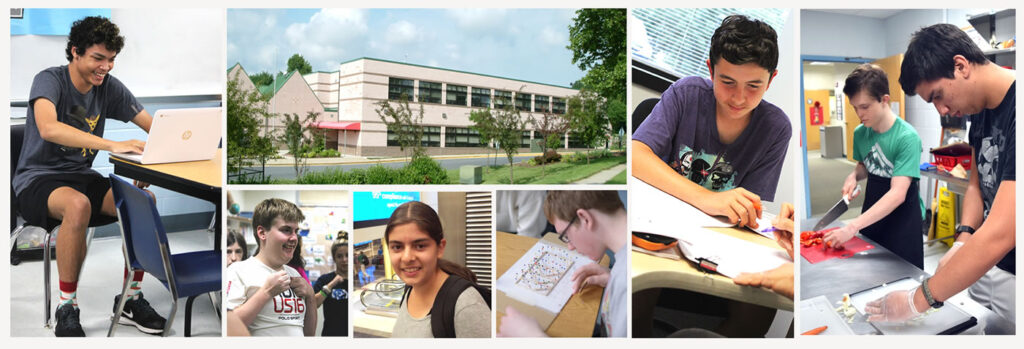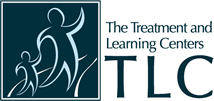Katherine Thomas School – Programs
Notes for all Programs
- Schedule: Monday through Friday, 9:00 a.m. to 12:15 p.m.
- Transportation: Parents are responsible for transportation. School staff assist parents with carpooling to the extent possible. Funded students are transported by the local school system.
Preschool
The Katherine Thomas Preschool (KTS Preschool) uses a developmental model in a comprehensive half-day afternoon program for four- and five-year-olds with complex and varied learning difficulties. Early intervention is critical to developmental growth, and our team of professionals works to create an individualized program to promote development and address differences for children. The preschool offers a small student-to-staff ratio.
Our preschoolers have differences in language, sensory regulation, motor tone/planning/sequencing, auditory/visual-spatial processing abilities, and all of which can interfere with a child’s ability to interact and communicate with peers and adults in their environment. Students strengthen foundational skills necessary for academic and social success through the support of our multidisciplinary team.
A child-appropriate for admission to the preschool must be four years of age, able to communicate wants and needs through verbal and nonverbal means, and behavior must be manageable for the staff ratio in the classroom setting.
Curriculum
The preschool curriculum is based on the DIR-FCD model which analyzes each child’s developmental levels and unique sensory processing profiles in order to individualize learning. Significant focus is placed on addressing foundational capacities for learning which targets expanding students’ abilities to share attention, maintain regulation, sustain shared engagement, and support problem-solving skills. Language, social-emotional, motor, and visual-spatial skills are targeted throughout the day. Multi-sensory lessons based on students’ interests make learning meaningful and motivating which supports generalization to functional life skills.
Teaching Methods
The staff creates an atmosphere in which the children feel comfortable and ready to interact and build positive relationships. Sensory experiences are provided to increase or decrease arousal, to increase experiences of positive affect in social interactions, and to facilitate child initiations during play sessions and small and large group routines. There is a focus on each child’s strengths, favored activities, materials, and interests in planning fun and meaningful activities and routines throughout the day.
Lower and Middle School

The Katherine Thomas School (KTS) Lower and Middle School Programs serve students in kindergarten through 8th grade with language and learning disabilities, autism, intellectual disabilities, and/or other health impairments that affect their learning. We address the individual needs of each student to facilitate success at home, school, and in the community. The staff to student ratio is an average of one to six but can be as low as one to two in some programs with an integrated team approach.
Curriculum
We infuse all lessons and activities with developmentally appropriate and language-based experiences. Students are instructed using a grade-level curriculum and support from research-based interventions focused on their individual needs. Basic skills in reading, written expression, and math are taught according to the specific needs of students in either a small group or an individualized setting. Our goal is to provide students with a positive, success-oriented program. The Maryland College and Career Ready Standards and Universal Design for Learning techniques are embedded in all lessons. KTS uses Positive Behavior Interventions and Supports (PBIS) to foster student growth, both academically and behaviorally.
High School

The Katherine Thomas School High School Program (KTHS) is tailored for students in grades 9 through 12 with language and learning disabilities, autism, intellectual disabilities, and/or other health impairments. High school students may earn a diploma or a certificate of completion; however, all students receive instruction in a wide range of core academics and elective classes, based on their jurisdictional graduation requirements. Maryland and private pay students may also choose to follow a career and technology pathway as a graduation requirement option. All students receive transition services geared toward helping them adjust to a less restrictive environment, including college, specialized post-secondary programs, technical training, and/or employment.
Curriculum
KTHS students need support, resources, and individualized instruction. It is our goal to provide all students with a positive, success-oriented curriculum. The Maryland College and Career Ready Standards and Universal Design for Learning techniques are embedded in all lessons. KTHS uses Positive Behavior Interventions and Supports (PBIS) to foster student growth, both academically and behaviorally.
In addition to core academic classes, students may take electives in art, music, drama, foreign language, technology, physical education, and reading. Experiential and cross-curricular instruction includes, for example, a crime scene investigation involving government, science, math, and graphic design classes as well as annual artist residencies in slam poetry, visual arts, and Capoeira Angola.
Career and technology programs of study, which can also be taken as elective classes, include child development, entrepreneurship and business management, hospitality management (culinary skills), restaurant management, and college/career research and development. A highlight of KTHS is the job internship program, in which students engage in relevant workplace experiences at job sites with professionals and mentors and participate in employment readiness, leadership, and future planning seminars.
Teaching Methods
Our student body includes those who can expect to attend college as well as students who expect to transition into post-secondary programs or employment after completing high school. Multi-disciplinary teams work together to deliver instruction that enables students to develop their potential and achieve academic success. Our integrated, multidisciplinary teams are comprised of special educators, teacher assistants, speech-language pathologists, occupational and physical therapists, social workers, and administrators. Working together, they provide programs with a blend of educational and therapeutic services that meet the holistic needs of each student. The Katherine Thomas School offers special programs for students depending on their individual needs to succeed academically and socially.
Students enjoy many opportunities for strengthening social skills, developing friendships, and building leadership skills through working at the student-run school store and participating in after-school clubs, dances, Prom, Best Buddies, and horseback riding sessions.
Special Programs
The Katherine Thomas School offers specialized programs for students whose academic and social challenges cannot be met within the regular programs. These programs offer a greater intensity of services with higher staff-to-student ratios and integrated related services.
STRIDE
STRIDE is an 11-month Lower and Middle School program for students who exhibit significant challenges with engagement, attention, regulation, group process, and social interactions that require more intensive support to succeed academically and socially.
BOOST
BOOST is a 10-month Lower and Middle School program for students who need concentrated support throughout the day to succeed academically and socially.
EXCEL
EXCEL is an 11-month High School program for students who display significant challenges in perspective-taking, engagement, attention, regulation, group process, and social interactions that require more intensive support to succeed academically and socially.
Additional High School Programs

Transition Services Program
Our Transition Services Program helps each student find the right post-secondary opportunities that meet his or her specific and unique needs. Whether the student intends to enter college upon graduation, attend a specialized post-graduate program, or enter the workforce, the high school provides assistance in a variety of areas to ensure that the student is making the right choice and is fully prepared to succeed in whichever direction they choose. This includes supporting the student in transition-related activities, determining the student’s anticipated adult service needs, and linking the student and parent with potential adult services. The long-range goal is to ensure that students are fully included and independent in the community.
Coordinated by the Transition Support Teacher, the student-centered transition processes are designed to meet the student’s educational, employment, and independent living outcomes. These outcomes may include the following: postsecondary education, job training, employment (supported), continuing and adult education, adult services, independent living, and community participation.
The high school program offers a variety of courses to prepare for independent living and employment.
- Reality 101: Independent Living – utilizes hands-on experiences to guide students through the decisions that will have an impact upon their future and empowers them with the skills and knowledge to live in a competitive and rapidly changing society.
- Quantitative literacy – enhances the students’ abilities in mathematical decision making and financial literacy and the culinary classes provide relevant, practical experiences that include studying the value of a nutritious diet and healthy lifestyle.
- Job internship program – offers juniors and/or seniors the opportunity to participate in a site-based experience in conjunction with a career seminar class. By working with industry professionals and mentors, students gain and apply knowledge and skills sets through relevant workplace and seminar experiences while refining career goals and postsecondary plans.
- Career and Technology Education Programs of Study – state-approved programs that satisfy the career and technology graduation option requirements:
- Hospitality management (culinary skills)
- Child development
- Entrepreneurship and business management
- College/career research and development
Finally, transition services are a team effort, and evening transition planning workshops and individual meetings with parents are offered to ensure our students’ successful transition to the next steps and the future.
Transition services are also critical because, at the age of majority, unless their parent has secured guardianship, students with disabilities have the right to make their own IEP decisions. It is incumbent on the adults on the IEP team – the parents, educators, and other professionals – to ensure that students with disabilities are prepared for this important role.
Special Programs
The Katherine Thomas School offers specialized programs for students whose academic and social challenges cannot be met within the regular programs. These programs offer a greater intensity of services with higher staff-to-student ratios and integrated related services.
STRIDE
STRIDE is an 11-month Lower and Middle School program for students who exhibit significant challenges with engagement, attention, regulation, group process, and social interactions that require more intensive support to succeed academically and socially.
BOOST
BOOST is a 10-month Lower and Middle School program for students who need concentrated support throughout the day to succeed academically and socially.
EXCEL
EXCEL is an 11-month High School program for students who display significant challenges in perspective-taking, engagement, attention, regulation, group process and social interactions that require more intensive support to succeed academically and socially.
